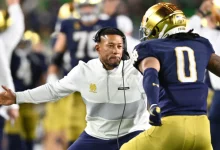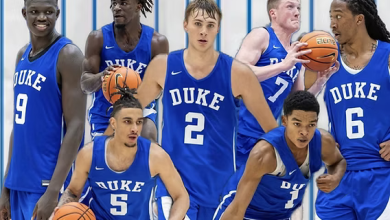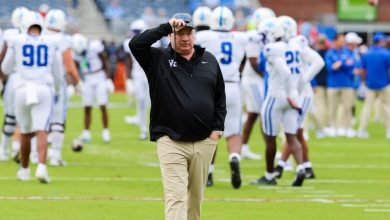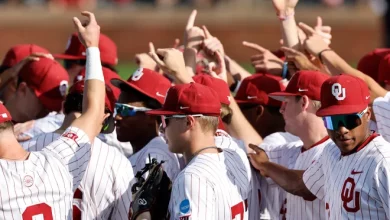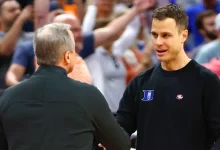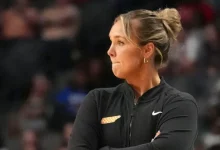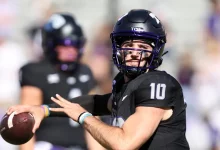Boo Carter’s uncertain future at Tennessee involves team altercations, a change of agents, and mounting controversy, placing him at the center of Vols’ off-field drama.

The landscape of college football is often a tapestry woven with talent, ambition, discipline, and sometimes, turmoil. When a promising athlete like Boo Carter finds himself embroiled in off-field issues—altercations with teammates, a change of representation, and mounting controversy—it not only affects his personal trajectory but also raises questions about the program’s stability and future. This comprehensive analysis explores the various facets of Boo Carter’s uncertain future at Tennessee, examining the incidents, potential repercussions, the context within the Vols’ program, and the broader implications for college athletics.
Background on Boo Carter
Boo Carter emerged as a highly-touted recruit, lauded for his athleticism, versatility, and potential as a dynamic playmaker. His recruitment generated buzz among college football fans and analysts, with Tennessee securing his commitment amidst expectations of him becoming a key contributor.
As a highly-rated athlete, Carter’s arrival at Tennessee symbolized the program’s efforts to invigorate its roster with young talent capable of elevating the team’s competitive level. His potential impact on the field was widely anticipated, but off-field issues threaten to overshadow his athletic promise.
The Incidents and Controversies
1. The Altercation with Teammates
One of the most significant developments in Boo Carter’s tumultuous period at Tennessee is an altercation with teammates. While specific details are often shielded by confidentiality or remain unconfirmed, reports suggest that tensions escalated during team activities, possibly involving disagreements over practice intensity, playing time, or personal conflicts.
Such altercations are not uncommon in competitive team environments, especially among high-caliber athletes under pressure to perform. However, when these incidents become public or involve physical confrontations, they raise red flags about team chemistry, leadership, and the maturity of the athlete involved.
For Tennessee, a program with a storied history of discipline and resilience, such incidents threaten to undermine team cohesion and could potentially lead to disciplinary action or even suspension if deemed severe enough.
2. Change of Agent and Representation
Another critical factor complicating Boo Carter’s situation is his change of agents. Transitioning representation during a college career can be indicative of shifting personal priorities, external influences, or strategic moves related to NIL opportunities or future professional prospects.
A change of agent amid controversy can be viewed in different lights. It could signal Carter’s attempt to navigate legal, contractual, or personal challenges, or it might reflect external pressures or misalignments with previous representation.
In the context of college athletics, athlete-agent relationships are subject to NCAA regulations, and any questionable associations or actions can have repercussions, including eligibility concerns or investigations into improper inducements.
3. Mounting Controversy and Media Scrutiny
The combination of team altercations and agent change has attracted media attention, fueling speculation about Carter’s future at Tennessee. Social media, fan forums, and sports news outlets have amplified the controversy, sometimes casting Carter in a negative light or questioning his commitment to the program.
Public perception can influence coaching decisions, team dynamics, and even NCAA eligibility considerations. The university’s response to these issues will be pivotal in determining whether Carter remains a part of the Vols’ roster or faces disciplinary or administrative action.
Broader Context: Tennessee’s Program and Culture
1. Program Expectations and Standards
Tennessee’s football program has a storied history rooted in discipline, resilience, and excellence. Under head coach Josh Heupel, the team emphasizes accountability, focus, and competitive spirit. Any off-field controversy involving players is taken seriously, as it can tarnish the program’s reputation and impact recruiting efforts.
2. Handling Off-Field Incidents
Historically, Tennessee has taken measures to discipline players involved in misconduct, emphasizing the importance of representing the university positively. Whether Carter’s incidents are deemed serious enough for suspension, probation, or termination depends on internal investigations, the severity of the altercation, and Carter’s actions post-incident.
3. Impact on Team Dynamics
High-profile conflicts can ripple through the team, affecting locker room chemistry and morale. If Carter’s behavior is perceived as disruptive, coaches may consider benching or dismissing him to maintain stability.
4. NIL and Agent Relationships
The NCAA’s evolving NIL landscape has added complexity to athlete-agent relationships. While NIL offers new revenue streams, it also raises concerns about improper influence, compliance, and athlete rights. Carter’s agent change could be linked to seeking better NIL opportunities or navigating contractual issues.
Potential Outcomes and Implications
1. Continued Presence and Reintegration
If Carter demonstrates remorse, maturity, and a commitment to the team, coaches might choose to reintegrate him after a period of suspension or counseling. This scenario depends on the severity of the altercation, Carter’s response, and the team’s needs.
2. Disciplinary Action or Dismissal
Alternatively, if the incident is deemed serious—such as physical violence or violation of team rules—Tennessee could opt for disciplinary measures, including suspension or even dismissal. This would serve as a message to the team about accountability and standards.
3. Impact on Career and Future Prospects
For Carter, these controversies could influence his draft stock, NIL opportunities, and future professional prospects. A strong showing of accountability and growth could salvage his reputation, while continued issues might hinder his development.
4. Broader Program Repercussions
High-profile incidents like this can affect recruiting—potential future players may be wary of joining a program with internal conflicts. It can also influence team cohesion and the coaching staff’s approach to discipline and player management.
The Role of Media and Public Perception
In today’s digital age, social media amplifies athlete controversies rapidly. Fans, analysts, and opposing teams scrutinize every move, sometimes sensationalizing incidents. Managing public perception becomes essential for the university and coaching staff, as negative narratives can influence recruiting, sponsorships, and overall program reputation.
Coaches and administrators must balance transparency with privacy, addressing incidents decisively while avoiding unnecessary damage to players’ reputations or the program’s image.
Key Challenges Facing Tennessee
- Maintaining Discipline and Culture: Ensuring that players uphold the standards of the program amidst controversies.
- Rebuilding Trust: If Carter’s behavior has damaged relationships within the team, efforts to restore trust are vital.
- Navigating Legal and NCAA Regulations: Managing agent relationships and NIL dealings within legal boundaries.
- Balancing Talent and Stability: Deciding whether Carter’s athletic potential outweighs the off-field issues.
Broader Implications for College Athletics
Boo Carter’s situation exemplifies broader trends and challenges in college sports:
- NIL and Athlete Autonomy: Changing the dynamics of athlete representation and influence.
- Player Behavior and Program Image: The increasing scrutiny athletes face, and the importance of discipline.
- Conflict Resolution and Leadership: How programs handle internal conflicts sets a precedent for team culture.
- Recruitment and Retention: Incidents like these can influence future recruiting strategies and athlete retention.
Navigating an Uncertain Future
Boo Carter’s current predicament at Tennessee underscores the complex interplay between talent, discipline, reputation, and personal development in college athletics. His altercation with teammates, change of agent, and the controversy that has ensued place him at the center of the Vols’ off-field drama—a situation that demands careful handling by coaching staff and university officials.
The path forward hinges on Carter’s actions, the team’s response, and the university’s commitment to upholding standards. Whether he remains a key contributor or faces disciplinary action, his case serves as a reminder of the high stakes involved in balancing athletic ambition with personal responsibility.
Ultimately, Tennessee’s handling of this situation will influence not only Carter’s career but also the program’s culture and reputation. Success will depend on transparency, accountability, and a collective effort to restore stability and focus on future achievements.


